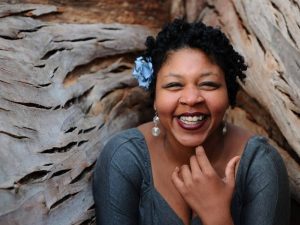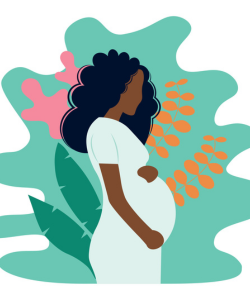
Dismantling the Ghosts of the Institution: An Interview with Amber McZeal, Ph.D.
Interview by Angela Borda
Amber McZeal is a Ph.D. graduate from the Community, Liberation, Indigenous, and Ecological depth psychology program at Pacifica, as well as being the founder of the Decolonizing the Psyche organization. I am delighted to be speaking with her today.
 Angela: You first came to Pacifica in 2013, for your M.A. in Depth Psychology with Specialization in Somatic Studies, and from there you pursued your Ph. D. in our CLIE program. What drew you to Pacifica, and in particular CLIE?
Angela: You first came to Pacifica in 2013, for your M.A. in Depth Psychology with Specialization in Somatic Studies, and from there you pursued your Ph. D. in our CLIE program. What drew you to Pacifica, and in particular CLIE?
Amber: I attended my undergrad at Goddard College in Vermont and it has a transformative pedagogy with self-directed learning, so I was able to create my degree focus on sound therapy and trauma. There was a lot of somatics in that, a lot of it was neuroscience, metaphysical concepts and afro-indigenous myths. I ended up having a ton of dreams during that process of writing my undergrad thesis, so I had an appendix of 45 pages of a dream journal. I had never heard of dream tending, but was introduced to Pacifica by a cohort, Antonia C., and it seemed like a deepening of what I’d started to scratch the surface of, and I decided to apply. The focus of Somatics is about the body, and I wanted a more critical lens that incorporated the African-American body. I was really fortunate to receive support from Dr. Cally Hutter and Dr. Susan James, who invited me to transfer into the CLIE program, where I was well-met, to finish my Ph.D. The good fit was decoloniality and being introduced to decolonial theory as a critical approach to understand the ritual of othering and the ritual of creating that margin of people or even the body itself as being something other than the mind or less valuable. That was a main contribution of the program and it colored my entire dissertation. The other strong point was the emphasis on indigenous stories as a valid process. Entering into CLIE, I was given a way of articulating that valid knowledge approach to tending the inner world. It was just a good fit.
Angela: You describe yourself as a “writer, vocalist, sacred scholar, and artivist,” each of which seems like it could be a remarkable and worthy career in its own right. What catches my eye most is “artivist,” as it’s a term I haven’t heard before. Can you explain more about what this is?
Amber: It’s an allusion that puts activities and artists together. That is born out of my personal experience as a survivor of Katrina in 2005 and moving to the Bay Area in 2006 and launching my career as an activist, as a necessity of survival. I cherished my mentors and teachers there, but I found something was missing. I do stand on the shoulders of many who have used art as their form of activism. Like Sweet Honey in the Rock is an example, singing about “some of us were born on the bottom, we grew up from the bottom, and then we declared we’d never return to the bottom.” It speaks to the incorrect idea that some are expendable and some are highly prized, and reviving dignity and self-love and agency to that segment of people who have been declared expendable. I have to honor these artists who came before me.
In my own life, I’ve been working on an afro sci-fi novel, which contains songs that I’ve written about healing from these kinds of cultural traumas. So my activism doesn’t always need to take the form of community scholarship or tutelage, it can also be a super receptive posture of absorbing something creative. African characters in space and depth psychology, when I think of my own approach to science fiction, I think more about tending the stars from the earth, not necessarily African characters in space. I study astrology, so I pull that symbolism not only from the western Greek astrological mythology, but Egyptian. The other piece that comes to mind with depth psychology is that coloniality reduces the perspectives that are allowed. There is a whole tradition of Mali’s Dogon people who have a ritual with Sirius B. Somehow these people in a remote village in Mali, have performed ceremonies every 50+ years without the invention of telescopes; they’ve tracked the movement of this star and they have original myths that their people came from this star. And in the 70s, when the west developed telescopes, they were able to confirm the existence of Sirius B. Moving to more spaciousness and more wholeism requires that we bring in other myths and mixes.
 Angela: I have been reading some articles recently that talk about the disparity in quality of treatment given to African American patients vs. the treatment given to Caucasian patients, especially as it pertains to the pandemic. Your dissertation at Pacifica, “Radical Love Traditions: Exploring the Decolonial Turn in Maternal Healthcare for Black Women,” focuses on “the phenomenon of maternal mortality in the United States and the racial health disparities embedded within it, with an emphasis on racism as the root cause.” I am especially curious how depth psychology approaches this issue, and what aid it can render us in healing and resolving the disparity.
Angela: I have been reading some articles recently that talk about the disparity in quality of treatment given to African American patients vs. the treatment given to Caucasian patients, especially as it pertains to the pandemic. Your dissertation at Pacifica, “Radical Love Traditions: Exploring the Decolonial Turn in Maternal Healthcare for Black Women,” focuses on “the phenomenon of maternal mortality in the United States and the racial health disparities embedded within it, with an emphasis on racism as the root cause.” I am especially curious how depth psychology approaches this issue, and what aid it can render us in healing and resolving the disparity.
Amber: My dissertation is devoted to tending the ghosts of the institution, and this is where it intersects well with depth psychology. In my research what I found is the father of gynecology, so J. Marion Sims, who is considered the father of medicalized birthing. The emergence of what we have today was experimented and practiced and refined on the bodies of enslaved black women. In my research, talking to newly minted obgyn’s and new nurses, I learned they are still being taught that people feel pain differently based on their race. This is literally what J. Marion Sims used to justify his unethical experiments. So the ghosts of the institutions are alive and well.
Speaking to the point of cultural healing, what I gleaned is that you have a small amount of that narrative in the textbooks, all of which is based in social fallacies, but the majority of the transmission around the narrative of black women feeling pain differently is an oral tradition handed down from the elder doctors to the newer doctors and that’s the intersection of where the cultural trauma exists. So this is why we have to start at the institutional level and stop that racializing, de-humanizing narrative that is hundreds of years old. The most well-known might be Serena Williams who had to advocate over and over for her own body and her awareness of what she needed, but all of these doctors dismissed her concerns. So there is the somatic component, the assumption that women don’t know their own bodies, then there’s the racial narrative that black people don’t have the right to their own body. Those are the ghosts of the institution.
My ancestors have been in Louisiana since the 1700s, and a lot of these practices took place there, and there’s a way of birthing and revering the womb that exists prior to colonial demarcations. What CLIE offered me, after moving through the fire wall of that historical experience, was the African indigenous approach that I wove into my CLIE dissertation; it afforded me to breathe life back into a generative and life-affirming relationship to birthing people, as opposed to a dehumanizing and extractive way of birthing.
Angela: This year you’ve said you’ll be “re-launching the Decolonizing the Psyche: Decolonial Somatic Approaches series, with an emphasis on embodied praxis + theories of change—reimagining social contracts through an Indigenous and Archetypal lens” as part of the courses and workshops you offer. For anyone to whom this is a new concept. What does “decolonizing the psyche” mean and what does a depth psychological approach contribute to it?
Amber: Decolonizing is moving away from silos to more conceptual understandings. Depth psychology has that. I was invited to read the Art of Inquiry, the principles around psyche we had to learn and incorporate. Psyche, something we can’t see is real, is a radical departure from what you would call colonial logic, which is materialistic, which asserts that if you can’t see it, it isn’t real. That’s what makes CLIE really unique, because it expands what depth psychology had set out to do. Jung was on the fringe of the dominant field of psychology, bringing in the mythic and the shamanic, even though there are colonialism and racism and sexism that he wrote about, but in the context of that period of time when the field of DP emerged, he was a radical figure. So decolonial theory expands that radical element by bringing in more voices, more sensibilities.
DTP (Decolonizing The Psyche) is an experiential process that centers the cultivation of critical consciousness–C3–coupled with embodiment practices to foster transformation. These practices are intended to disrupt patterns of coloniality embedded in the psyche and body. DTP is a gesture at producing alternative conceptions of being, knowing and doing—beyond the racialized and human-centric conceptions that have distorted relationships with ourselves, with each other and with the more-than-human world.
Angela: You reference “Afro-Indigenous spiritual technologies” as being part of what you use in your work. I’ve never seen the term “spiritual technologies” before. What do you mean by that and what would be an example of its use in practice?
Amber: Dr. Mary Watkins, who recently retired as Co-Chair in the CLIE program, went to dinner with me at the beginning of my dissertation and she asked me why I was using the word “technology.” I had to look up the etymology of the word. A technology is a treatise on an art form, coupled with spirituality, it’s the treatise on spiritual meaning, practice, and navigation. I’ve read it before. It’s mainly in spiritual circles. Spiritual technology is adjacent to depth psychology because it’s an approach to tending the inner world and meaning making that’s rooted in that inner world, not just African, but most indigenous cultures. My dissertation focused on ancestor reverence as a site of knowledge production, and that’s an expression of spiritual technology. When I sat with my ancestors who lived in Louisiana in the 1800s and offered ritual or prayer or artwork, when I opened up myself to taking seriously the dreams they would bring me as a form of communication, that’s what depth psychology is all about, taking that seriously and weaving into your everyday experience. In that regard, Jung and I are like twins, dare I say?
I was fortunate to find a network called Ancestral Medicine Network, and I now offer ancestor healing sessions to different clients. It’s part of what I do, help people cultivate their own intuitive knowledge and connection with their ancestors. There is an inner hearing of things that I would relate more to my body, which is my altar to my ancestors (I have a body because they existed), I call it reading my own cells, there will be words or narratives or scenes that come in my drop-in embodied space. Taking the time to tend those narratives and trying not to push them away as insignificant, that’s the depth psychological approach, as well as much as the other indigenous approach. Dreams are like a telephone from your ancestors to you. The elements are part of the ancestral kinship network. Dr. Daniel Foor founded the network and he’s also a depth psychologist who graduated from Pacifica. I stumbled upon him, and that was the missing core for my dissertation. What attracted me was that it was structured, safe, and built on three pillars: Not all the dead are equally well; we affect the dead and the dead affect us; and lastly, the dead can change. The strategy is to bypass the troubles of the recent dead, who are harboring immense cultural pain that has not been ritualized and so they are not necessarily the most loving advocate to plug into, but there’s something behind them, connecting with ones much older is the goal of this ancestor lineage healing approach. Colonializing is 500, 600 years old, but go back longer than that, to a few thousand years ago. The primordial waters are the ancestors of all of us and are much older than us. The trees are the ancient ones, the mineral bodies that we’re mining and pulling up are much older than us.
Angela: For current or potential students who are wondering how they will use their degree in a professional sense after graduating, I think that your forging your own organization and path to educate about a topic you are passionate about is very courageous and inspiring. Tell us a little about your work, how it endured during Covid, and what you most enjoy about teaching these workshops?
Amber: Thank you for your kind words. I didn’t know how meaningful it would be to be seen. It does take courage, and “kissing the fear” was the first step in finding the courage. Dr. Joseph Cambray said in 2013 in his introduction to depth psychology, “The field of psychology is dead, and it’s dead because it was invented by Victorian Era white men, and they couldn’t possibly know everything to know about the soul. Your charge is to find new language. In order to break something, you have to know it very well.” That has rang in my consciousness when I took a risk and decided to teach on my own. So taking the opportunity to reflect on what is broken and why the trauma persists, knowing that very well has supported me in taking risks and finding the courage to create something new. We do need more change agents, and transformative catalysts in the world. Those who utilize global networks to curate their own sites of knowledge-production; those who curate art, who use the technology we have in service to creating a more just and humane world. We find ourselves at this crossroads that says, “After the stronghold on knowledge that we’ve been suffering under the last millennia, there’s a crescent moon of a doorway to walk through, and if we don’t submit to those narratives of fear, we can walk through it.”
Angela: If there was one teachable point you most hope to get through to the public, what would that be?
Amber: One teachable aspect of this emerged in my dissertation work. The focus of that was racial disparities in maternal healthcare. On the surface, that is read as there being something about these particular bodies that maintains this symptom of early maternal death, but this “racial group” is not the root cause, unlike the approach of coloniality. I moved to “racism” being the root cause. It is the structures of inequity and othering and the kind of stress that this produces that then yields the disparities in the health outcomes, it is not something unique to that particular body that caused those symptoms. That critical lens of how this was created in order to move into the depth of this cultural trauma, and from this depth place is where it can be transformed. So the battle we’re having in Florida, where Ron Desantis is trying to remove the A.P. African American course, is trying prohibit a critical consciousness, because if we understand how the “other” was created, then we might get out of the habit of othering others. And that is a fear, because othering is profitable. Toni Morrison has a book of essays she wrote a few years ago about this. Exploitative capitalism comes from the othering, creating that other in order to scapegoat them and sustain the exploitive profit.
The intersection from a depth psychological perspective is the collective consciousness, where the cultural trauma lives; race and the hierarchy of some people being “better” than others is a cultural trauma, a dysregulation over the entire cultural body’s nervous system. It lives within the collective, and within the individual body, that unmetabolized cultural trauma becomes personality, so there are a lot of ways to work with this.
Angela: Thank you so much for your time today in speaking with me and the best of luck in your work.
Amber McZeal. Writer, vocalist, sacred scholar, and artivist, Amber utilizes sound therapy and guided somatic imagery to engage the knowledge of the body within an interactive and liberatory arts practice. In 2018, Amber launched her organization, Decolonizing the Psyche, where she weaves somatic praxis with Afro-Indigenous spiritual technologies and social justice—deep decoloniality—in efforts to end oppression and create more humane social relationships. Amber holds an M. A. in Somatic depth psychology and Ph. D. in Community, Liberation, Indigenous, and Ecological depth psychology.
Angela Borda is a writer for Pacifica Graduate Institute, as well as the editor of the Santa Barbara Literary Journal. Her work has been published in Food & Home, Peregrine, Hurricanes & Swan Songs, Delirium Corridor, Still Arts Quarterly, Danse Macabre, and is forthcoming in The Tertiary Lodger and Running Wild Anthology of Stories, Vol. 5.




